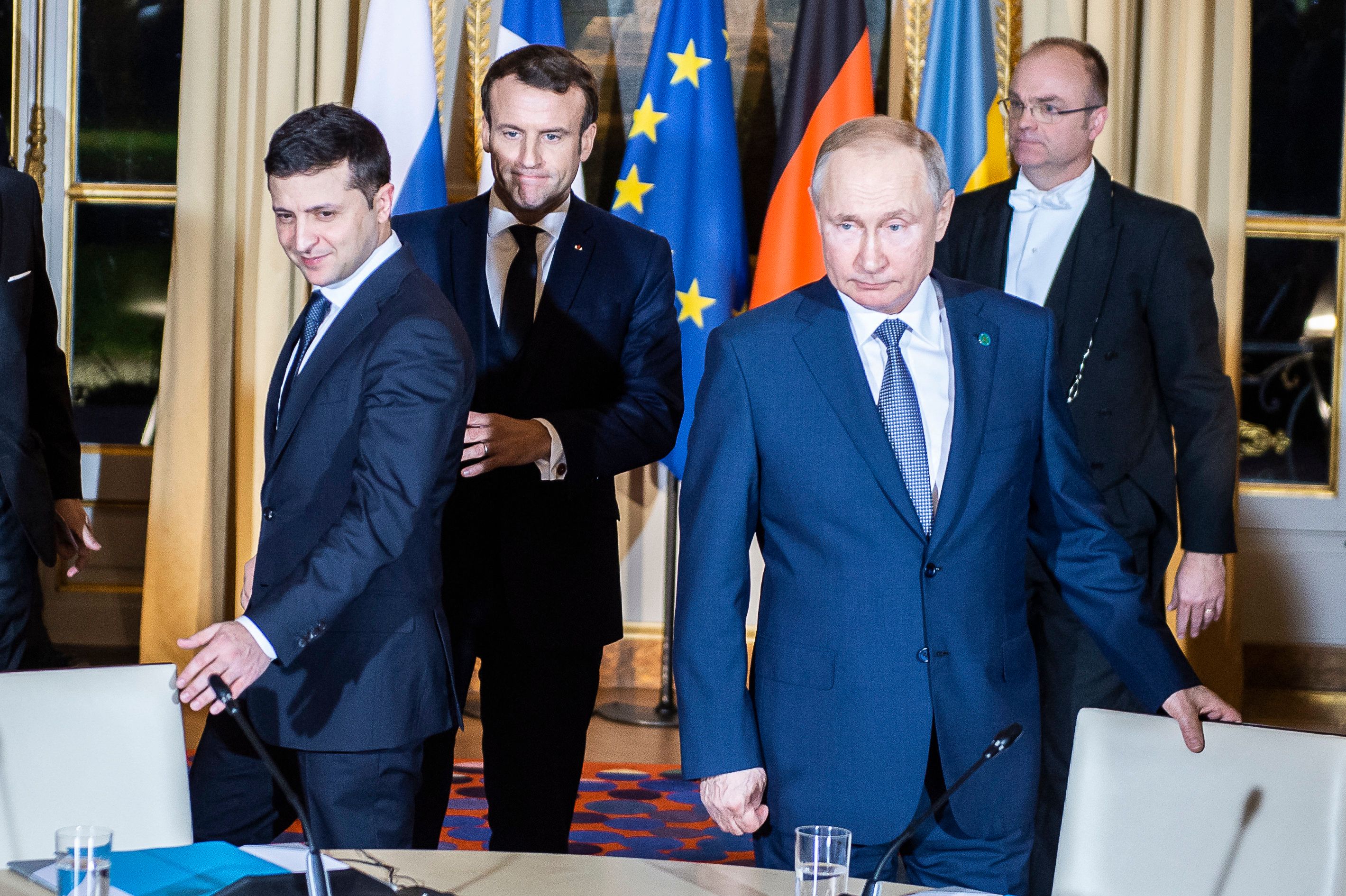December 09, 2019
Russia's Vladimir Putin and Ukraine's Volodymyr Zelensky sat down yesterday with Germany's Angela Merkel and France's Emmanuel Macron for a meeting in the Elysée Palace in Paris for peace talks. This was the first-ever meeting between Putin, Russia's dominant political force since 2000, and Zelensky, who was a TV comedian at this time last year.
Not much was agreed beyond a broader exchange of prisoners and a renewed commitment to a ceasefire that has never held. Fears that Putin would use Zelensky's inexperience to back him into a deal on Russian terms weren't realized, but the relationship between the two has only just begun.
Why are Ukraine and Russia fighting? In November 2013, Ukraine's government was on the verge of signing a landmark agreement to boost Ukraine's economic integration with Europe. At the last moment, Ukraine's then-president Viktor Yanukovych backed out, triggering demonstrations in the Maidan, Kyiv's central square. Police cracked down, but protests intensified.
Western governments then brokered a compromise, but a mix of pro-European and right-wing nationalist protesters rejected that deal, forcing Yanukovych to flee to Moscow.
In response, Putin then ordered Russian troops to seize Crimea, the only province of Ukraine with an ethnic Russian majority. He also provided weapons, irregular troops, and political support for separatists in two eastern regions of Ukraine (Donetsk and Luhansk) near the Russian border. Ukrainian troops advanced on the area. The resulting conflict has killed more than 13,000 people.
What does Putin want? To keep Ukraine in Russia's sphere of influence by blocking deeper integration with Europe. Putin wants to use this conflict to force Ukraine's government to rewrite its national constitution to give local governments veto power over Ukraine's foreign and trade policies. If governments in Donetsk and Luhansk had that power, their patron in Moscow would have it too.
What does Zelensky want? Peace. That means Russian troops withdrawn from Ukraine's eastern provinces, and the restoration of Kyiv's control over the breakaway provinces.
Is there a peace plan? Yes. There are the Minsk agreements of 2014 which call for:
- a pullback of forces and military equipment on both sides
- Ukrainian amnesty for fighters who haven't committed war crimes
- local elections, then special status, for Donetsk and Luhansk
- withdrawal of all non-Ukrainian soldiers and weapons
- restoration of Ukraine's control over its border with Russia
This plan hasn't ended the fighting because Ukraine and Russia can't agree on the order in which these steps should be taken or who has to move first.
Then, on October 1, the newly elected Zelensky formally committed Ukraine to something called the "Steinmeier formula," which establishes a sequence:
- First, elections to be held in the eastern provinces under Ukrainian electoral laws
- Then, if European monitors say the vote was fair, the provinces get self-governing status, and Ukraine takes back control of its border with Russia.
Faced with fierce criticism at home that agreeing to this sequence was a "capitulation" to Putin, Zelensky then insisted that Ukraine must be given control of the border (which means all Russian troops must leave) before elections are held.
The larger stakes: Many Ukrainians see Zelensky's apparent waffling on the peace plan as evidence that the experienced Putin is a wily cat waiting to pounce on the foolish canary Zelensky. (In fairness, Putin looks at everyone that way.)
There are still too many differences of opinion for a breakthrough toward peace, but fears that Zelensky's naivete would give Putin the deal he wants have been averted.
For now. The story continues.
From Your Site Articles
More For You
As expected, the Supreme Court struck down the bulk of Donald Trump's sweeping “Liberation Day” tariffs as illegal … and almost nothing changed.
Most Popular
What's Good Wednesdays
What’s Good Wednesdays™, February 25, 2026
Sponsored posts
Small businesses at a crossroads
Chris, an Army veteran, started his Walmart journey over 25 years ago as an hourly associate. Today, he manages a Distribution Center and serves as a mentor, helping others navigate their own paths to success. At Walmart, associates have the opportunity to take advantage of the pathways, perks, and pay that come with the job — with or without a college degree. In fact, more than 75% of Walmart management started as hourly associates. Learn more about how over 130,000 associates were promoted into roles of greater responsibility and higher pay in FY25.
Ukraine's President Volodymyr Zelenskiy, Finland's President Alexander Stubb, Estonia’s Prime Minister, President of the European Commission Ursula von der Leyen and other European leaders visit memorial to fallen Ukrainian defenders at the Independent Square on the fourth anniversary of Russia's full-scale invasion, in Kyiv, Ukraine February 24, 2026.
Ukrainian Presidential Press Service/Handout via REUTERS
Somewhere in the Donbas region, Ukrainian soldier Artem Bondarenko says he hasn’t slept through the night in months as he defends Eastern Ukraine.
- YouTube
In the latest episode of Vladimir Putin and Xi Jinping's hit wellness podcast This Authoritarian Life, we learn how positive communication patterns can break negative cycles in our relationships -- especially our relationships with Iran, Syria, Venezuela, and Cuba. #PUPPETREGIME
© 2025 GZERO Media. All Rights Reserved | A Eurasia Group media company.
